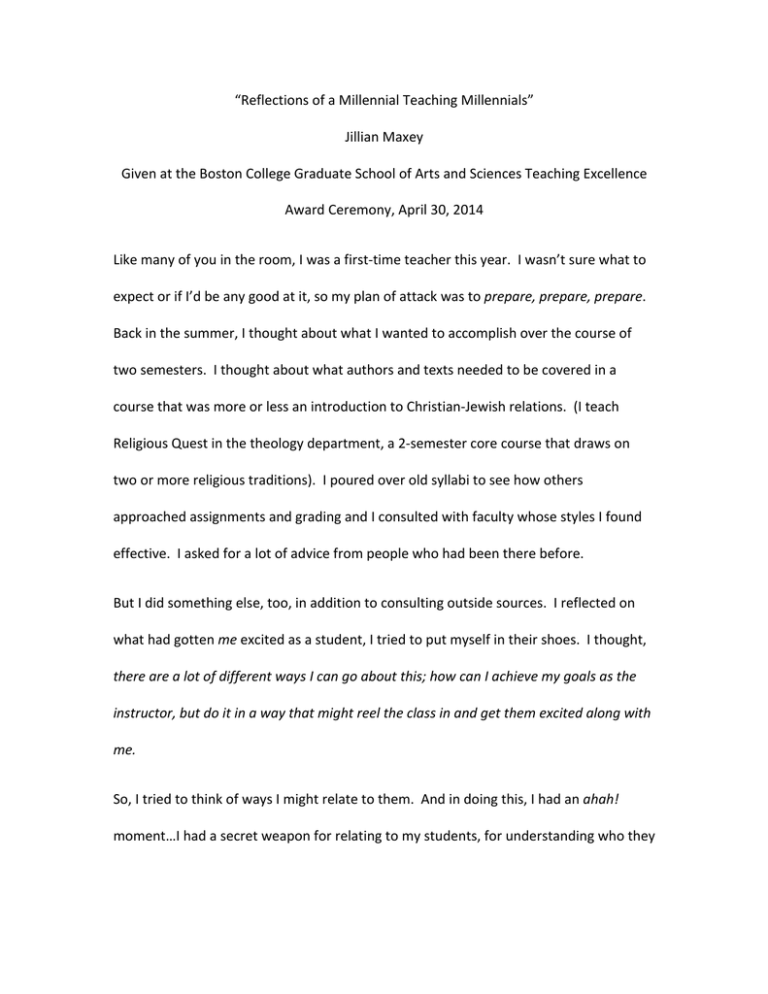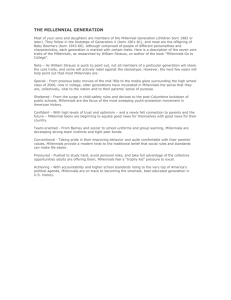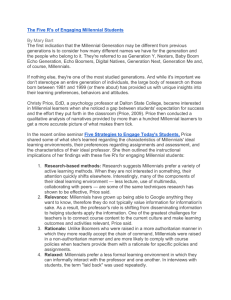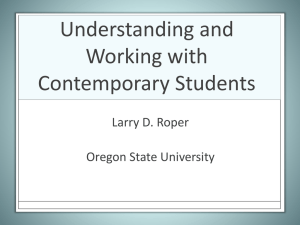Document 11226699
advertisement

“Reflections of a Millennial Teaching Millennials” Jillian Maxey Given at the Boston College Graduate School of Arts and Sciences Teaching Excellence Award Ceremony, April 30, 2014 Like many of you in the room, I was a first-­‐time teacher this year. I wasn’t sure what to expect or if I’d be any good at it, so my plan of attack was to prepare, prepare, prepare. Back in the summer, I thought about what I wanted to accomplish over the course of two semesters. I thought about what authors and texts needed to be covered in a course that was more or less an introduction to Christian-­‐Jewish relations. (I teach Religious Quest in the theology department, a 2-­‐semester core course that draws on two or more religious traditions). I poured over old syllabi to see how others approached assignments and grading and I consulted with faculty whose styles I found effective. I asked for a lot of advice from people who had been there before. But I did something else, too, in addition to consulting outside sources. I reflected on what had gotten me excited as a student, I tried to put myself in their shoes. I thought, there are a lot of different ways I can go about this; how can I achieve my goals as the instructor, but do it in a way that might reel the class in and get them excited along with me. So, I tried to think of ways I might relate to them. And in doing this, I had an ahah! moment…I had a secret weapon for relating to my students, for understanding who they were and getting them to connect with me and the course. We were both Millennials. I would be a Millennial teaching Millennials. Hopefully, this term is a familiar one. Its often splashed across the pages of the New York Times, bloggers write about it, and the Pew Forum and others try to explain what it means through elaborate studies and surveys. But very simply, it refers to people born between the early 1980s and the early 2000s, so today’s 10-­‐30 year olds—a range that includes everyone in my classroom including me. On the negative side of things, Millennials are bemoaned as narcissistic kids who were (are) coddled by their parents, given a trophy or award for everything they did, and who rely on technology and other material comforts to get by. They grew up in highly structured environments participating in lots of organized activities and groups. But on the positive side, Millennials are optimistic, friendly and welcoming, used to working in groups, have a positive self-­‐image and crave feedback. So how did this play out in my classroom, how did we millennials fair with this mixed bag describing us. I’d like to offer a few reflections as a Millennial teaching Millennials. I’ll focus on technology, pedagogy, rewards, meaning-­‐making, and relationships. I’ll start with the simplest. The technology bit was pretty simple to navigate. I was willing to try new things and they taught me a lot of new things. We eschewed the clunky interface of Blackboard and instead relied on Google Drive and Gmail, which became much easier since BC’s migration of students and faculty to Gmail over this year. I was able to upload readings and revised syllabi, they could submit papers and I could return them all electronically. I used PowerPoint in my lectures and a relatively new app called Flipboad to create my own magazines from resources culled from across the internet which I could then share with the class. They could read them, or flip through them, on the go, on their iphones and ipads. I tried to bring their assignments into their time and space, literally into the palm of their hand wherever they were. On their end, they introduced me to Prezi, an online presentation tool that might replace PowerPoint, and used a group texting app called GroupMe to coordinate group project meetings. Knowing that Millennials like structure, but flexibility, like to be autonomous yet have their ideas respected and taken seriously, I took this into account in my pedagogy. I had clearly defined objectives, clearly defined readings and prepared a lecture for almost every class. But we often revised the syllabus to adjust our pacing if a topic proved difficult to understand, not as interesting as I had hoped, or more fascinating to them as I expected. I allowed them to jump in and comment, my lectures built in time for their opinions and I took them seriously. How I structured the class time was closely related to the kinds of assignments I gave them and how I evaluated them. All I have to do is mention the concept of grade inflation and you’ll all know what I’m talking about—the pressure to give students high grades and the response students have to grades under, well really an A-­‐, is something I had to think about. Rather than completely take the issue on or feel that my hands were completely tied, I tried to slowly instill in them the idea that the work—the process of the assignment, was just as important as the end result. I have to say the success was limited, but it helped that over the year I varied the types of assignments they had to do—personal essays, research papers, group presentations, even a group essay—that was one where I really had to get them to buy in that the process of working together was really the main aim of the assignment—daily reading responses, and writing their own lecture on a contemporary ethical issue. Tapping into their hunger for feedback, I commented extensively on all of their assignments. Hands down my favorite “task” was reading and commenting on their written reading responses. This is where I got to know each of them individually, how they think, what their assumptions are and was able to have a conversation with them—albeit in the margins in pen and ink, but conversations that flowed out of classroom discussions and spilled into office hours. I did have a few students who wanted to challenge a grade they had gotten, but I took this as a sign of their initiative, gave them a task to revise what I had regarded as the problem, and realistically rewarded their second attempt. I got a teachable moment, they got an extra half a letter grade. We both win—trophies for everybody! But where I think we really connected, and where the fact that we were all of the same group or generation, was in the desire to communicate effectively, discuss who we are, how we define meaning in our lives and what helps build solid and authentic relationships. This is where being at a Jesuit institution really enhanced the shared language we had. So while we were all pretty adept with technology, that didn’t replace our back and forth in the classroom, I still required them to come by office hours in advance of large assignments, and I build in opportunities for them to work with each other. Alongside history and theology, they had to learn how to have real life face to face conversations with their classmates. I also tried to keep in mind that they—well we—are involved in a lot of other things besides just the professor-­‐student interaction that brought us together in this class. They have jobs, majors, extra curriculars, families, friends, internship and job searches, and other activities. I have my family, my doctoral work, my hobbies, my job search. So rather than force them or me to leave these things at the door, I tapped into the millennial desire for a connected identity and integrated experiences. I asked them how what we were doing applied to their other courses. This was fairly easy to do when we discussed bioethics and I have budding nurses, med students and biology researchers in the class. My accounting and finance students had a lot to say when we talked about the economy. My athletes knew I cared how their seasons were going. In turn, they knew when I had a dissertation deadline looming, or was applying for a job or my daughter was feeling under the weather. In other words, we got to know each other as people. It may sound cliché, but the work I got from them reflected a heightened level of buy in. We had our last class this morning. I brought my daughter in to meet them. My dad helped me co-­‐teach the class, we took a group picture afterwards and a few of them even asked me to take a selfie. I’m not sure that any class will ever top my first one. The window of time in which I and my students have the shared experience of being millennials will close, but I’m grateful that my first experience teaching was so successful. Just like them, I like positive feedback! I’ll end by, of course, offering my congratulations to everyone in the room who is being honored, and by thanking everyone who has been such a big support to me: my parents, husband, and daughter, and the rest of my family. Professor Ruth Langer, my dissertation advisor and all around go-­‐to person, and others in the theology department and across the university who have gotten to know me and have helped me along the way. I appreciate the opportunity I was given to be a Teaching Fellow this year, I will never forget it.






